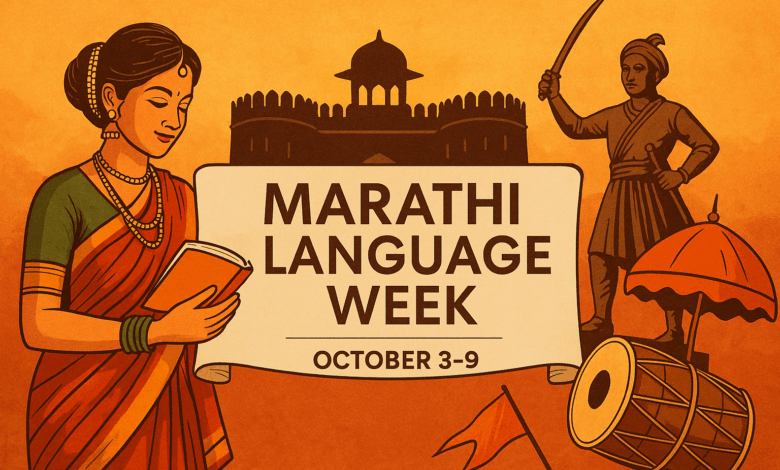
Maharashtra to Celebrate ‘Classic Marathi Language Week’ from October 3
Nagpur, October 2, 2025 — Maharashtra is gearing up for a cultural celebration as the state government officially announced the commencement of ‘Classic Marathi Language Week’ beginning October 3, 2025. The week-long festival will commemorate the recognition of Marathi as a classical language and highlight its deep-rooted contributions to India’s cultural, literary, and historical heritage.
A Tribute to Marathi’s Rich Legacy
Earlier this year, the Union Government granted classical language status to Marathi, placing it alongside Sanskrit, Tamil, Telugu, Kannada, Malayalam, and Odia. This recognition, long demanded by scholars, writers, and cultural organizations, was celebrated across the state. Marathi, with over 83 million speakers worldwide, has a legacy that spans more than a millennium, with its earliest texts dating back to the Mahanubhava and Sant literature traditions.
By declaring October 3–9 as Marathi Language Week, the Maharashtra government aims to celebrate the journey of the language, its evolution, and its profound impact on literature, arts, and social reform movements.
Planned Events Across Maharashtra
The week will witness an array of cultural programs, literary seminars, and artistic performances across the state. According to officials, events will include:
-
Poetry and Literature Festivals – Celebrating works of iconic Marathi poets and authors, from Sant Dnyaneshwar and Tukaram to modern-day writers.
-
Drama and Folk Theatre Performances – Revival of traditional art forms such as Tamasha, Powada, and Sangeet Natak.
-
Exhibitions on Marathi Manuscripts and History – Showcasing ancient scripts, rare texts, and the language’s journey through centuries.
-
School and College Competitions – Elocution, essay-writing, and debate contests encouraging young students to connect with their linguistic heritage.
-
Digital Outreach – Special campaigns on social media and online platforms to spread awareness among younger, tech-savvy generations.
The main state-level inauguration ceremony will take place in Nagpur, while district-level cultural councils will organize parallel events across Maharashtra.
Voices of Pride and Celebration
Speaking on the occasion, Maharashtra’s Chief Minister expressed pride in the recognition of Marathi as a classical language. “Marathi is not just a medium of communication; it is the soul of Maharashtra. From saints to revolutionaries, from literature to cinema, Marathi has shaped India’s culture. The celebration of Classic Marathi Language Week is our tribute to this timeless heritage,” he said.
Renowned Marathi author and Jnanpith Awardee, Bhalchandra Nemade, highlighted the importance of the festival, saying: “This recognition is not only a matter of pride but also a responsibility. Our duty is to preserve and promote Marathi for future generations. The Language Week is a chance for the youth to rediscover the treasure that lies in Marathi literature and art.”
Bridging Generations
The celebration is not merely about honoring the past but also about ensuring the relevance of Marathi in the modern era. In recent years, there has been concern over the declining use of Marathi in urban households, where English often dominates. By engaging schools, universities, and digital platforms, the state aims to bridge this generational gap.
Officials have confirmed that Marathi learning apps, e-books, and audiobooks will also be promoted during the week, ensuring that technology plays a role in the revival of interest. Marathi cinema, already a flourishing industry, will also join in the celebrations with special screenings of classic films.
Economic and Cultural Boost
Beyond cultural pride, the week-long events are also expected to provide an economic boost to local artisans, performers, and publishers. Handicraft fairs, book exhibitions, and theatre festivals will not only promote Marathi culture but also create opportunities for livelihood and tourism.
The government has announced subsidies and grants for organizations and NGOs contributing to the promotion of Marathi during the festival. Special stalls featuring Marathi books, local cuisines, and folk art will be set up in public spaces to engage citizens.
A Step Towards Global Recognition
With large Marathi-speaking communities living abroad, particularly in the United States, United Kingdom, and Gulf countries, the celebrations will not be limited to Maharashtra. Several international cultural groups have announced parallel programs, making it a global festival of Marathi pride.
Scholars believe that such initiatives will help internationalize Marathi studies, encouraging universities outside India to expand their South Asian language programs to include Marathi literature and linguistics.
The Classic Marathi Language Week is not just a festival; it is a symbol of identity and pride for millions of Marathi speakers worldwide. It represents a conscious effort to connect history with the present and inspire future generations to uphold their linguistic and cultural heritage.
As Maharashtra prepares to immerse itself in this celebration, the hope is that it will ignite a renewed passion for Marathi — not only as a language of tradition but as a living, evolving force that continues to shape India’s cultural and intellectual landscape.
